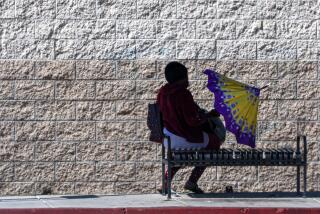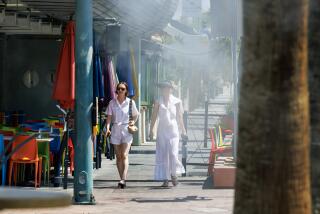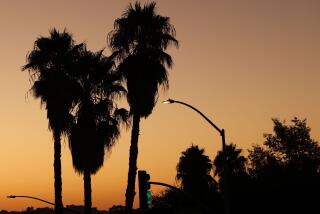Sizzling Heat Bakes Most of Country : Weather: Southwest bears brunt, with record 115 temperature set in Phoenix. Chicago sends city workers to check on vulnerable elderly.
- Share via
The scorching heat smothering much of the country eased slightly Saturday, but still left many looking for relief from temperatures that hit triple digits.
The Southwest got the worst of the hot weather. Tropical moisture streaming across the Southwest into the Great Basin raised desert humidity levels as well.
Phoenix was 97 at 2 a.m., and climbed to 115, breaking the record for the day of 113, set in 1972. To make matters worse, 1,500 homes were without electricity--or air conditioning--after 14 power poles were knocked over in an overnight storm. Power had been restored to most homes by Saturday evening.
The National Weather Service issued heat advisories from the Southwest through the Plains for a heat wave that has plagued the country for about two weeks. The hot weather was forecast to linger over the Southwest and the central states.
In Chicago, where the medical examiner has blamed 546 deaths on the summer’s heat, the mercury hit 95, and hundreds of workers and volunteers were checking on elderly residents, who are especially vulnerable.
Most victims of the killer heat spell that peaked at 106 degrees on July 13 were elderly and lived alone. Many feared opening windows because of crime. Others, afraid of costly electric bills, died with their air conditioners unused.
City officials have promised to reach all 440,000 senior citizens in Chicago and instituted a heat plan to warn residents about the danger. Department On Aging spokeswoman Tanya Mitchell acknowledged, however, that workers could directly reach only about 20,000 seniors.
The department called in its 50 outreach workers and solicited volunteers to staff phones and take to the streets to distribute fans and persuade elderly residents to go to air-conditioned senior citizen centers.
“I think overall, we’re more alert to the dangers of heat,” Mitchell said.
More to Read
Sign up for Essential California
The most important California stories and recommendations in your inbox every morning.
You may occasionally receive promotional content from the Los Angeles Times.













